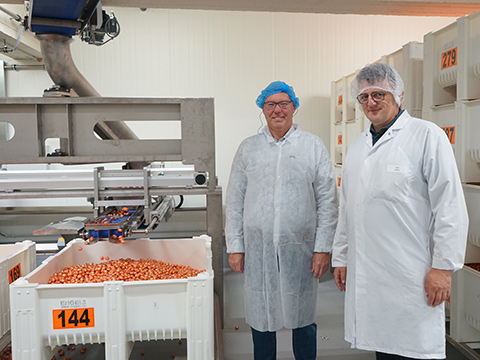
Posted to News on 22nd Feb 2024, 09:00
Electric drives deliver perfect Easter egg flavour combinations for Mondelez
Mondelez has chosen Festo electric drive technology over pneumatics for a new automated chocolate Easter egg mixing installation at its site, due to lower energy consumption, higher safety and more flexibility in controlling speeds and positions.

(See Festo at MachineBuilding.Live, 2 October 2024, on stand 27)
The egg mixing line uses an ingenious system of conveyors to ensure that everyone finds a nice mix of flavours in their pack of chocolate eggs at Easter.
Mondelez is a large, international player in the food industry with many renowned brands in its portfolio, such as Cte d'Or, Milka and Oreo. The Ergomix project was instigated to support the production of Easter eggs, with the objective of improving ergonomics for operators. Egg production runs practically all year round in order to have enough stock at Easter to meet seasonal demand. In the past, eggs were mixed by manually putting together trays of different flavours, which was labour-intensive. In the new facility, this process has been fully automated.
Achieving the perfect mix
Once the eggs come off the forming line and are individually packed, they go via conveyor belt to the new plant where they are initially sorted into large pallet bins by flavour. These trays are then prepared via a robot either for mixing or to be picked up by a mobile robot for temporary storage in a warehouse.
Once all the necessary flavours for making a mix are ready, the eggs are transported via funnels to precise positions on a wide conveyor so that all the flavours are lined up next to each other. At the end, the eggs re-enter a pallet bin where the different flavours are perfectly mixed.
The first challenge in terms of drive technology was to ensure that the eggs are neatly distributed when filling the pallet bins. Otherwise, they would not be level, which would make stacking the bins impossible. The second challenge was positioning the hoppers over the conveyor on which the mix is assembled. This required a flexible system because not every mix contains the same number of different flavours. Finally, a suitable drive also had to be found for the gripper on the robot, which moves the 150kg pallet bins.
Our starting point for this project was not to use pneumatics, says Bob Aerts of the engineering department at Mondelez. The reasoning was that electric drives score better in terms of energy consumption and it is also easier to implement all aspects of machine safety. We presented this to Festo and they not only understood our starting point and the applications we wanted to build, but were also able to offer all the components needed to make it all happen.
The design of the new plant was undertaken by Betecem, with Koen Roobaert, application engineer at Festo, advising on the component selection. Alax Automation was responsible for the programming.
Precise positioning
The new Ergomix installation is located in an air-conditioned room and operates fully automatically. To fill the pallet bins evenly, the system has been designed so that the conveyor belt feeding the eggs can be moved left and right via two timing belt shafts equipped with a servo motor and torsion shaft. An electric cylinder with spindle in the extension of the conveyor belt means it can also be extended forwards and backwards.
This combination means the system can position itself to drop eggs at any position in the pallet bin. The controller receives feedback from the weighing cells under the bin and the flow rate of the supply so that it can determine exactly where in the bin there is still room.
The positioning of the hoppers above the wide belt for mixing was also realised with electric axes. They allow the positions to be automatically adjusted to the number of flavours which need to be brought together in a given mix. Also, the gripper on the robot that moves the pallet boxes was equipped with a Festo ESBF electric cylinder with servo motor. All the CMMT servo motor controllers are housed in the electrical cabinet just outside the air-conditioned room. These communicate via Profinet with the PLC that controls the installation. Combining different egg flavours therefore no longer requires any manual handling.
Another advantage with Festo was that they offer a full range of components, says Bob Aerts. That includes not only the mechanical drives, gearboxes, motors and drives but also all the necessary mechanical fittings and accessories. This has helped enormously in standardising and also ensures that all the components are perfectly matched. The flexibility we now have with this installation, we would not have been able to achieve with pneumatic drives.
Want the latest machine building news straight to your inbox? Become a MachineBuilding member for free today >>

















